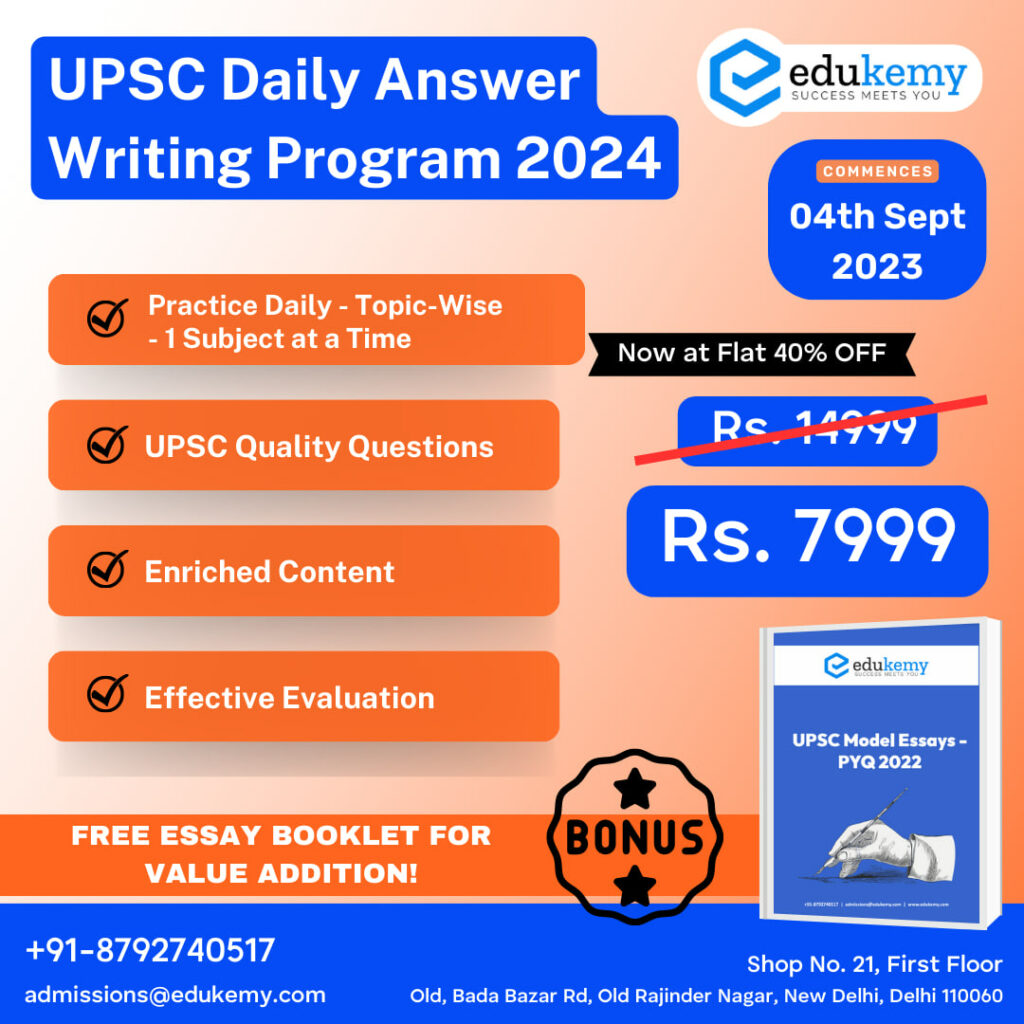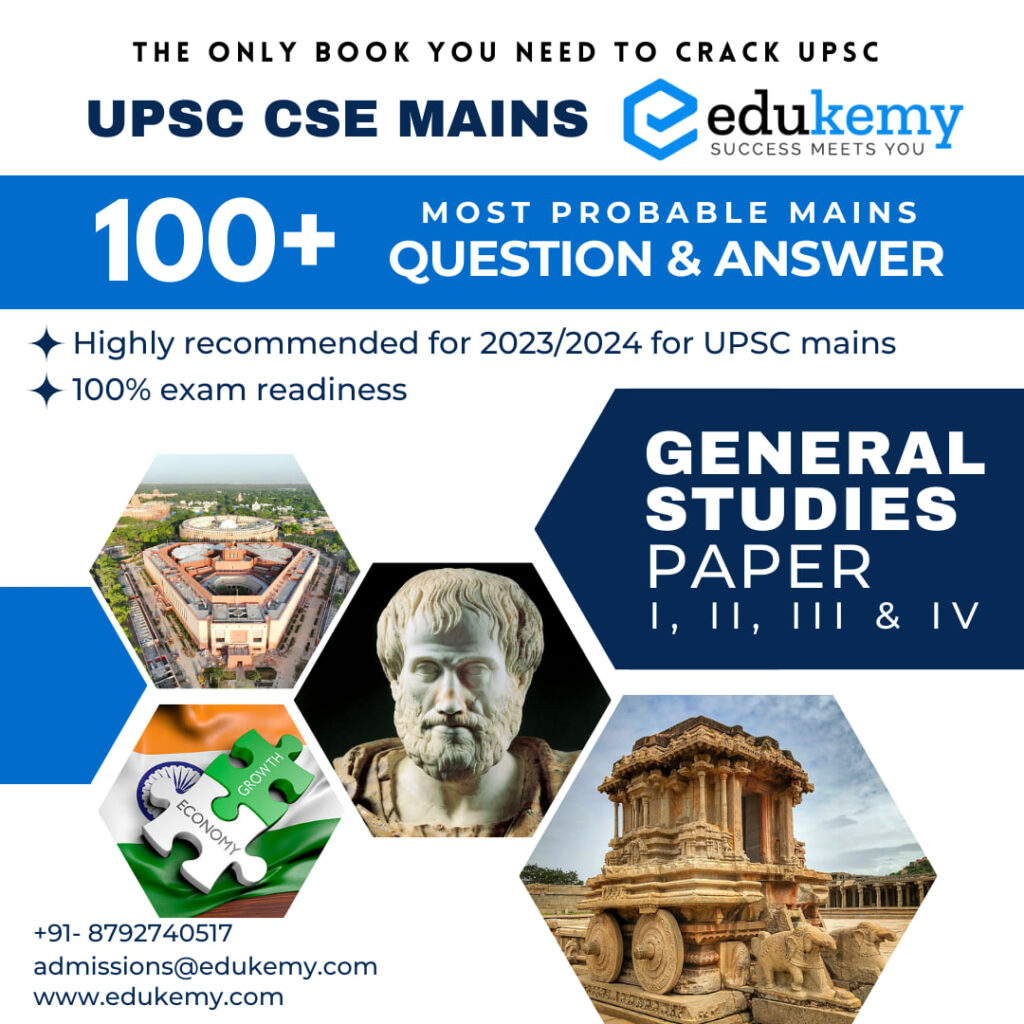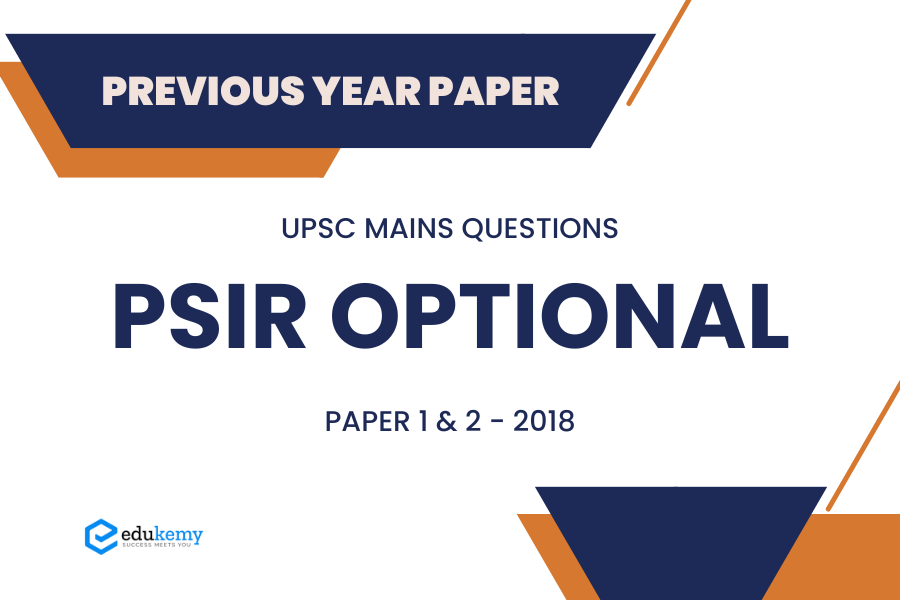

The UPSC (Union Public Service Commission) Main Examination is a rigorous and comprehensive assessment that plays a pivotal role in selecting candidates for various prestigious civil services in India. The Political Science and International Relations (PSIR) optional paper in the UPSC Mains examination is particularly significant, testing candidates’ understanding of political theories, governance structures, and global affairs. The UPSC Mains 2019 PSIR Optional Previous Year Paper serves as a valuable resource for aspirants preparing for the exam, offering insights into the examination pattern, question trends, and the depth of knowledge required. Analyzing and mastering this paper is crucial for candidates aiming to excel in the PSIR optional subject and, by extension, enhance their overall performance in the UPSC Main Examination.
Contents
- 1 Paper – 1
- 2 Paper – 2
- 3 Frequently Asked Questions (FAQs)
Paper – 1
Section – A
1. Comment on the following in about 150 words each: 10×5=50 marks
- (a) John Stuart Mill is a ‘reluctant democrat”. – C. L. Wayper 10 marks
- (b) Decline of Political Theory 10 marks
- (c) Distributive Justice 10 marks
- (d) Substantive Democracy 10 marks
- (e) “Nothing against the State, nothing over it, nothing beyond it.” – Mussolini 10 marks
2
- (a) Critically examine the neo-liberal theory of State. 20 marks
- (b) Analyse John Rawls justification of discrimination to achieve the goals of Justice.15 marks
- (c) Equality means fair treatment rather than equal treatment. Comment. 15 marks
3.
- (a) What do you understand by three generations of Human Rights? 20 marks
- (b) Critically examine Macpherson’s views on Democracy. 15 marks
- (c) Explain the relationship between power, authority and legitimacy. 15 marks
4.
- (a) John Locke is the father of liberalism. Explain. 20 marks
- (b) Discuss Ambedkar’s ideas on ‘annihilation of caste’. 15 marks
- (c) Critically examine Machiavelli’s views on religion and politics.15 marks
Section – B
5. Comment on the following in about 150 words each : 50×5=50 marks
- (a) Revolt of 1857 is a ‘Sepoy Mutiny’ or ‘First War of Independence’. 10 marks
- (b) Indian Constitution is a “Lawyers’ Paradise’. – Ivor Jennings 10 marks
- (c) New Panchayat Raj is an effective instrument for women empowerment. 10 marks
- (d) Implementation of GST and NEET is a major challenge to Indian federalism. 10 marks
- (e) Political personalities are more significant than political parties in India. 10 marks
6.
- (a) Whether judicial activism has undermined or strengthened Parliamentary Democracy in India? Discuss. 20 marks
- (b) Do the Lieutenant Governors have more powers than the Governors of the States ? Explain.15 marks
- (c) Critically examine the ethnic conflicts in North-East India. 15 marks
7.
- (a) Examine the provisions of Panchayat Extension Services Act (PESA), 1996. 20 marks
- (b) Analyse the arguments in favour and against the lateral entry into higher civil services in India. 15 marks
- (c) Discuss asymmetrical federalism in India. 15 marks
8.
- (a) Examine the various causes of the agrarian crisis in India. 20 marks
- (b) Explain the increasing role of regional political parties in national politics. 15 marks
- (c) Critically analyse the environmentalist movement in Tuticorin, Tamilnadu. 15 marks
Paper – 2
Section – A
Q1. Answer the following questions in about 150 words each: 10×5=50 marks
- (a) Describe the changing nature of Comparative Politics. Briefly explain the Political Economy approach to the study of Comparative Politics. 10 marks
- (b) Describe the changing nature of the State in the developing societies in the context of inclusive growth in the 21st century.10 marks
- (c) How big a role does identity play in determining political participation in the developing countries? Discuss your answer with suitable illustrations. 10 marks
- (d) Bring out the major differences between the Classical Realism of Hans Morgenthau and the Neorealism of Kenneth Waltz. 10 marks
- (e) What, according to Joseph Nye, are the major sources of a country’s soft power? Discuss its relevance in contemporary world politics. 10 marks
Q2.
- (a) Discuss the significance of Non-Aligned Movement as a unique contribution of the Non- Western world to World Politics. 20 marks
- (b) Discuss the consequences of Trump’s “America First” and Xi’s “Chinese Dream” on World Politics. 15 marks
- (c) “Some feel Multinational Corporations (MNCs) are a vital new road to economic growth, whereas others feel they perpetuate underdevelopment.” Discuss. 15 marks
Q3.
- (a) Discuss the relevance of UN Security Council Resolution 1325 on the security of women in conflict zones. 20 marks
- (b) Would you agree that the on-going debates on international environmental politics continue to be marred by a new North-South ideological divide over historical responsibility and developmental model? Illustrate your answer with suitable examples. 15 marks
- (c) “Since its inception the South Asian Association for Regional Cooperation (SAARC) has failed to deliver on its promises.” What initiatives should be taken to reinvigorate the organization? 15 marks
Q4.
- (a) Critically examine the notion of “Asian Values” in the context of the on-going debates on human rights. 20 marks
- (b) Discuss the implications of the Trump-Kim Singapore Summit on the prospects of denuclearisation of the Korean Peninsula. | 15 marks
- (c) Critically examine the Functionalist approach to the study of International Relations. 15 marks
Section – B
Q5. Answer the following questions in about 150 words each: 10×5=50 marks
- (a). Do you agree with the view that the Indian Foreign Policy is increasingly being shaped by the Neoliberal outlook? Elaborate. | 10 marks
- (b) “India is often said to have a rich strategic culture.” Discuss. 10 marks
- (c) Evaluate India’s stand on the recent Rohingya refugee issue. 10 marks
- (d) “India’s current foreign policy marks significant qualitative shifts from that of the previous regimes.” Discuss. 10 marks
- (e) Analyse the significance of India’s Look East Policy in the light of concerns of the indigenous peoples of North-east India. 10 marks
Q6.
- (a) India’s coalitional diplomacy within the WTO has earned it wide appreciation. What accounts for the success of India’s coalitional diplomacy? 20 marks
- (b) “India’s capacity building programmes under the Indian Technical and Economic Cooperation (ITEC) has earned much goodwill for it in Africa.” Discuss. 15 marks
- (c) “India’s Research and Information System for Developing Countries” (RIS) is a major initiative in the area of South-South Cooperation. Discuss. 15 marks
Q7.
- (a) Discuss the role of the Indian Council for Cultural Relations (ICCR) in promoting India’s soft power abroad. 20 marks
- (b) Discuss the role of Indian diaspora in promoting Indo-US relations. 15 marks
- (c) Discuss the various impediments in India’s way to a permanent seat in the Security Council. 15 marks
Q8.
- (a) Do you think that India’s capacity-building role in Afghanistan has shrunk the strategic space for Pakistan there ? Discuss. 20 marks
- (b) Critically assess the evolving convergence of India and China in the areas of trade and environment. 15 marks
- (c) Do you agree that the growing assertiveness of China is leading to multilayered Indo-Japan relations? Comment. 15 marks
Frequently Asked Questions (FAQs)
Q: How important is conceptual clarity in the PSIR optional paper?
A: Conceptual clarity is crucial in the PSIR optional paper. UPSC tends to focus on candidates’ understanding of political theories, international relations concepts, and their ability to apply these to real-world scenarios. A clear and precise expression of ideas is highly valued.
Q: How can one effectively manage time while answering PSIR optional questions in UPSC Mains?
A: Time management is key in the PSIR optional paper. Candidates should allocate time wisely, giving sufficient time to each question based on its marks weightage. It’s advisable to begin with questions you are most confident about to secure those marks and then move on to more challenging ones.
Q: Are contemporary issues important in the PSIR optional paper, or should the focus be on traditional topics?
A: The PSIR optional paper usually includes a mix of questions covering both traditional and contemporary topics. Candidates should be well-versed in classical political theories and international relations concepts while also staying updated on current affairs and their implications for political and international dynamics.
In case you still have your doubts, contact us on 9811333901.
For UPSC Prelims Resources, Click here
For Daily Updates and Study Material:
Join our Telegram Channel – Edukemy for IAS
- 1. Learn through Videos – here
- 2. Be Exam Ready by Practicing Daily MCQs – here
- 3. Daily Newsletter – Get all your Current Affairs Covered – here
- 4. Mains Answer Writing Practice – here
Visit our YouTube Channel – here

